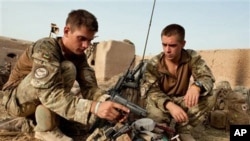According to classified U.S. cables released by the online group WikiLeaks, Britain's operation in Afghanistan's Helmand province was "a mess." The documents show how both American and Afghan officials were unhappy with the job done by British forces in the region.
Afghan President Hamid Karzai claimed that security deteriorated in Helmand province after the arrival of British troops there. In 2009, the governor of Helmand, Gulab Mangal, told U.S. Vice President Joe Biden that British security efforts in Sangin were inadequate.
And U.S. officials were themselves critical of the British. Former NATO commander Dan McNeill said the British had "made a mess" in Helmand and their tactics "were wrong."
Tim Ripley from the security magazine Jane's Defense Weekly says the animosity displayed towards British forces is no surprise. He says all the international forces in Afghanistan are critical of each other.
"There is definitely a certain disconnect within the international forces and definitely a disconnect between the international forces and the Afghan government," says Ripley. "There are major disagreements about what to do and what are the problems and how to resolve them. I mean that is not a revelation. it's a statement of the patently obvious," he says.
Earlier this year, British troops handed security of Sangin district in Helmand to U.S. forces.
At the time, the British commanding officer said British forces had made headway towards bringing peace and stability to Sangin.
On Friday, a spokesperson for Britain's Ministry of Defense told VOA that no comment would be made regarding leaked documents.
Ripley says the leaks highlight the failure of international forces to work together effectively.
"Obviously there is no unified approach to what is going on Afghanistan, which is at the heart of why progress has been so slow in Afghanistan and why there are great doubts about whether the endeavor will actually deliver the results that people hope," he says.
Antonio Giustozzi, an Afghanistan expert at the Crisis States Research Center in London,
says the leaks are damaging because they undermine the influence of international forces in Afghanistan.
"What is damaging is in the eyes of the Afghan partners because essentially international intervention tends to end up being discredited, in particular, the advice given by the Americans, the British or anybody else," says Giustozzi. "It is more difficult to advise the Afghans when the international partners contradict each other."
Britain has 10,000 troops in Afghanistan. As of November, 345 British soldiers have died there.
WikiLeaks has over 200,000 private U.S. cables and has been releasing them regularly over the course of the past week.
British Role in Afghanistan Blasted in Leaked US Cables




